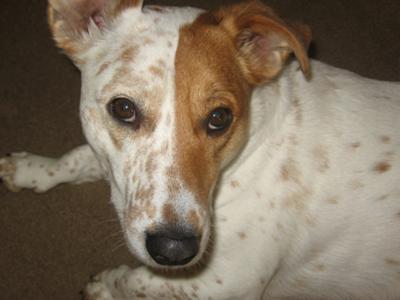Separation Anxiety - New Home
by Patty Purtell
(Hillsboro Ohio)
Dog Separation Anxiety in New Home Reader Question
Our daughter has left the country for two years and we have her basset/Australian cattle dog. Hiedi has been used to having children around to play with her. So far she has shown signs of anxiety by eating a loaf of bread,taking the eyes off of stuffed animals, trying to eat guerrilla glue, her bag of treats, taking Kleenex and shredding it from the bathroom trashcans and chewing on our best shoes while we are out of the house.
She has a loud threatening bark when people come to the door. When they come in she seems to want to attack them. We pull her back and she settles down and than wants the guest to give her attention. She is a loving dog but sometimes she scares me. I have to admit I didn't want to take her but I do want to give her a good home while she is here.
I walk her in the morning on a leash and I have been letting her walk without a leash on our property with me. If she is smelling or finds a good place to roll in she won't come when called. I am also worried because she sleeps alot and likes to lick everything she is touching not just licking for a little bit but until the area is wet.
Is it alright for her to lay around so much? Are we not giving her enough activities and if so what do we do? Is she taking food because she isn't getting fed enough. She has not gotten into the trash can in kitchen which is amazing because there is food she would love in it sometimes. She jumps up on the counters and pulls stuff toward her.
I would like to enjoy her instead of counting the days until her family returns.
Thank you
Mrs. Purtell
Dog Behavior Problem Editor Response
Dear Mrs. Purtell,
Thank you for your note. We hope some of these suggestions can help.
It appears that Heidi is suffering from dog anxiety related to the separation from your daughter, more so then this type of problem being in the nature of Australian Cattle Dogs. When a dog is separated from its "leader" it feels lost and is acting out. The goal is to give her someone to follow...you.
As these types of dogs are a highly energetic and an active breed, they need more time to play, exercise and roam around. Dog behavior problems such as the ones you describe are common in cases of separation, stress and exposure to a new owner and environment.
Here are few tips which can help to control these types of behavior and create a stronger relationship between you and your dog:
First of all, you’ll have to modify the behavior.
Try to stay positive as you try and change your dog's behavior, as challenging as it may be. Acting angry to any situation will just confuse the situation and add to your dog's anxiety.
In regards to guests, be firm and strict if she responds aggressively to guests
Exercise and different playful activities will help to resolve the problem very quickly. If you can, try and have your dog exercise for at least 20 minutes first thing in the morning, even if you get up early to do it. This will start the day with you as the leader.
When exhausted, Australian dogs show calmness and are proven to be friendly if they are kept busy in some kind of activity. Buy Hiedi a toy such as a
Chuckit! Ball
Also, they need more space to live in, thus you should provide extra space for playing if you can. Obviously you’ll have to provide this space outdoors. Do not try to keep her inside the home for long periods of time, as it is surely against the nature of this breed.
Another aspect of such behavior, and you too have noticed it, is related to food. The makeup of her food can impact behavior, anxiety and overall health. For the time being, you should try to feed Hiedi a balanced diet, preferably containing fewer proteins and specifically fewer amino acids. Some essential as well as non essential amino acids (unit of protein) may increase anxiety and nervousness once consumed and absorbed. A dog already reacting aggressively will surely become hyperactive with this kind of diet, thus, it is recommended that dogs with anxiety should consume fewer proteins in their diet.
Unfortunately, we couldn't find a good commercial diet that meets this nutrition goal, however, we did identify a supplement that can be mixed into her current diet called
Pet Naturals Of Vermont Calming Chews
Of course, if you are willing to go through the expense, a veterinary nutritionist could recommend a homemade diet that addresses dog anxiety.
Identify the interests and places where she feels more comfortable, but make sure that these places are clean and hygienic.
Also, do not allow her to disturb your behavioral modification plans, meaning you should keep an eye on her while she is isolated. Give her strict commands to obey.
Additionally, you can try a natural remedy such as Aggression Formula which is specially formulated for dogs that are experiencing these types of behavioral issues. These will help to maintain nervous system strength and will help to keep your pet calm while you try to develop a strong friendship with your pet.
Please let us know how Hiedi does.
Join in and write your own page! It's easy to do. How? Simply click here to return to Behavior.


